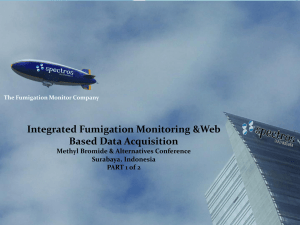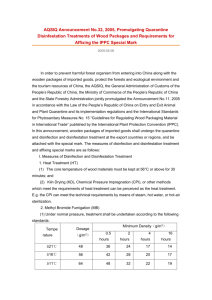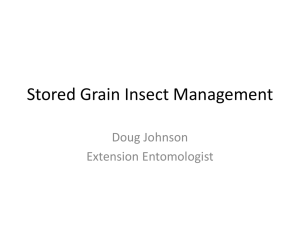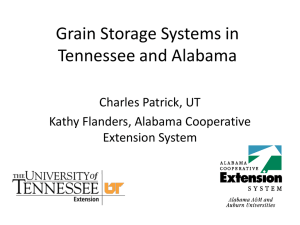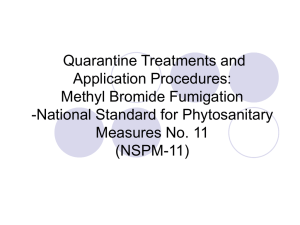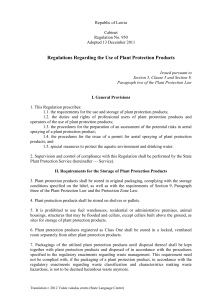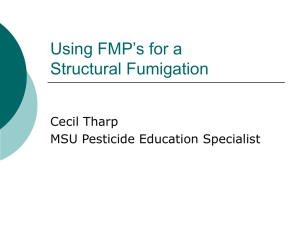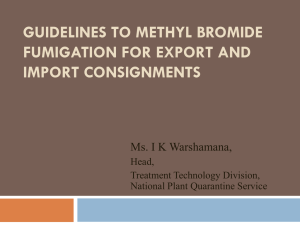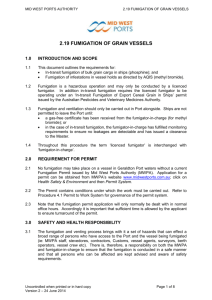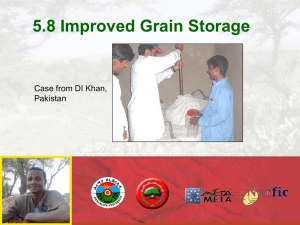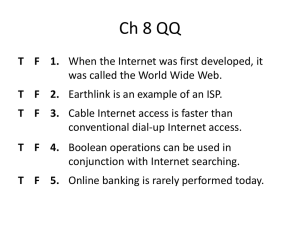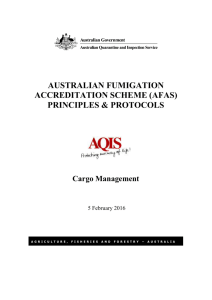Closed Loop Fumigation of a Concrete Elevator in Broken Arrow
advertisement
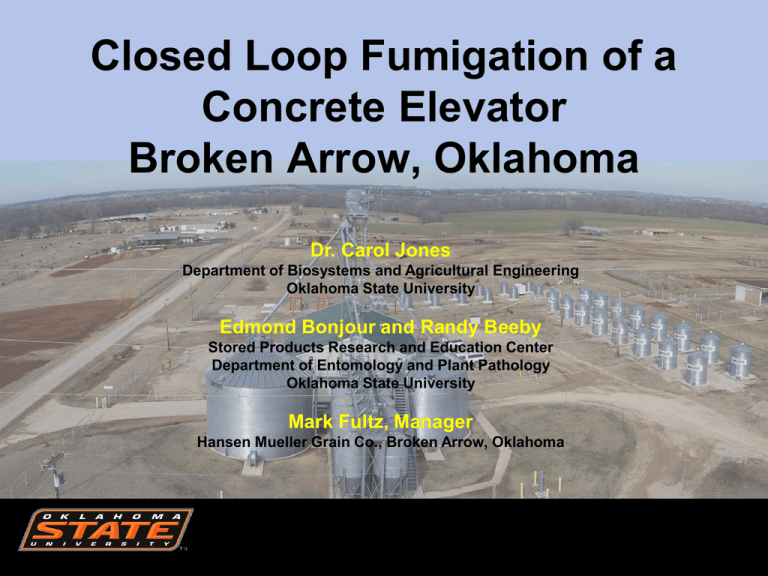
Closed Loop Fumigation of a Concrete Elevator Broken Arrow, Oklahoma Dr. Carol Jones Department of Biosystems and Agricultural Engineering Oklahoma State University Edmond Bonjour and Randy Beeby Stored Products Research and Education Center Department of Entomology and Plant Pathology Oklahoma State University Mark Fultz, Manager Hansen Mueller Grain Co., Broken Arrow, Oklahoma Urbanization around Rural Elevator Challenges • Fumigation safety is a concern to neighbors and to employees • Conventional methods of phosphine fumigation put workers and people in close proximity in danger • Improper fumigation leads to insect resistance Goals of this Project • Seek a method to improve safety of fumigating with phosphine • Seek a method to decrease the amount of fumigant required • Seek a method to increase the concentration distribution throughout the grain bins Common Fumigation Methods and Negative Effects • Probe and Tarp: exposure during tarping • Automatic Dispenser: pellets spill from buckets and release gas in unwanted areas, shrinkage caused from turning and moving grain • Gravity Fumigation: little control of where gas may go Each method offers increased risk of exposure during insertion of fumigant into the grain. Proposed Method • Closed Loop Fumigation System in a concrete silo • Example of a J-System patented by James Cook in 1980. • Consists of: – Sealing air leaks in storage structure – Installing low pressure low volume centrifugal blower recirculating air-gas mixture from headspace of grain into base of silo – Installing pipes from fan to blower and back into silos Closed Loop Basic Idea Pressured base ducts force gas mixture upward through grain bulk providing better gas distribution through grain. Headspace Grain Bulk Blower Bin Diagram of Elevator Facility #10 #1 #11 #3 #2 #12 #13 #9 #8 #14 #4 #15 #7 #5 #6 #16 #17 Closed loop system installed in one half of the elevator while the other half remained unchanged for a conventional method fumigant application CLF #10 #1 Conventional #11 #3 #2 #12 8660 MT capacity #13 #9 #8 #14 #4 #15 (120,000 bu) #7 #5 #6 #16 #17 Dosage: Phosphine Pellets • Manager chose his normal dosage rate of 500 pellets/1000 ft3 which is his normal dosage rate. Both sides of the elevator were treated the same. – CLF side: pellets distributed on top of the grain. – Conventional side: pellets were inserted into the grain as it was loaded into the bin Monitoring • Monitoring fumigation: top, bottom, and middle of bin Monitoring • Electronic gas meters were used to measure phosphine concentration every 4 hours for the first 32 hours and every 10 hours for the next 88 hours. Results CLF versus Conventional Fumigation 2500 CLF BIN 2000 ppm 1500 1000 CONVENTIONAL BIN 500 200 PPM 0 0 10 20 30 40 50 Hour from Treatm ent 60 70 80 A closed loop system was installed in one half of the elevator while the other half remained unchanged for a conventional method fumigant application CLF #10 #1 Conventional #11 #3 #2 #12 8660 MT capacity #13 #9 #8 #14 #4 #15 (120,000 bu) #7 #5 #6 #16 #17 Installation of CLF Bin Diagram of Elevator Facility Seal Inner Vents #10 #1 #11 #3 #2 #12 #13 #9 #8 #14 #4 #15 #7 #5 #6 #16 #17 Installation of CLF • Seal silos as completely as possible…inner vents to silos not included in loop Installation of CLF Bin Diagram of Elevator Facility Seal Outer Vents #10 #1 #11 #3 #2 #12 #13 #9 #8 #14 #4 #15 #7 #5 #6 #16 #17 Installation of CLF • Seal silos as completely as possible…outer vents Installation of CLF • Seal silos as completely as possible...access openings Proposed Method for Study Bin Diagram of Elevator Facility #10 #1 Headhouse #11 #3 #2 #12 #13 #9 #8 #14 #4 #15 #7 #5 #6 #16 #17 Install Fan on top of Bin 6 (outside of head house) Proposed Method for Study • Blower mounted outside on top of one bin adjacent to the head house. • 1/3 HP supplying 320 cfm Proposed Method for Study • Installing pipes from fan to blower and back into silos Down man lift shaft to ground level using 3 inch PVC sewage pipe Flexible hose from fan through window to man lift shaft Proposed Method for Study • Installing pipes from fan to blower and back into silos After Fumigation • Blower discharge piping was disconnected and the blower was used to evacuate the fumigant from the CLF system and bins. • Evacuation can be accomplished when the danger to workers or to residents around the elevator is the least. • Gas can be discharged 120 ft. above ground level reducing danger • Closed Loop Fumigation – – – – Installation costs Less fumigant Less labor Less worker exposure and health costs • Conventional Fumigation – Turning costs and product shrinkage – More fumigant – More labor – More bin entry required of workers causing health risk and higher insurance rates Economic Comparison ($4/bu wheat) Economic Comparison ($8/bu wheat) Conclusion • Closed loop fumigation was more successful since it reached the desired 200 ppm for 100 hours. Conventional fumigation did not reach this level. • ¾ of the fumigant could have been saved in this elevator • Closed loop fumigation is ultimately cheaper • Closed loop fumigation is safer than conventional fumigation when carried out properly Closed Loop Fumigation of a Concrete Elevator Broken Arrow, Oklahoma Dr. Carol Jones Department of Biosystems and Agricultural Engineering Oklahoma State University Edmond Bonjour and Randy Beeby Stored Products Research and Education Center Department of Entomology and Plant Pathology Oklahoma State University Mark Fultz, Manager Hansen MuellerGrain Co., Broken Arrow, Oklahoma
